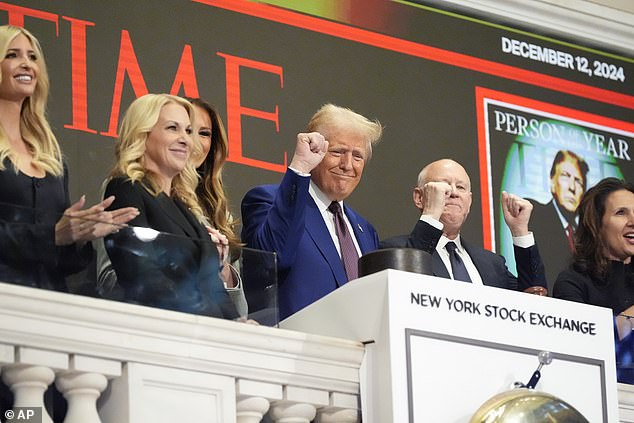[ad_1]
The threat of a punishing trade war sent Wall Street on a roller coaster Monday.
After initially falling sharply on worries about President Donald Trump´s tariffs, US stocks pared their losses after Mexico said mid-morning that it had negotiated a one-month reprieve.
The S&P 500 ended up falling 0.8 percent after Asian and European indexes logged worse drops. The Dow Jones Industrial Average ended up down slightly and the the Nasdaq sank 1.2 percent.
The US stock market had been on track for a much worse loss at the start of trading on worries about how much pain US companies would feel because of the tariffs.
The S&P 500 was briefly down nearly 2 percent, and the Dow dropped as many as 665 points.
Stocks steadily recovered after news of Mexico’s 30-day reprieve. Later in the day, Canada also announced it has secured a 30-day tariff reprieve of its own.
Both countries said they would each send 10,000 troops to protect their borders with America.
President Trump had threatened tariffs of 25 percent on Canadian and Mexican goods, initially planned to go into effect on Tuesday. A 10 percent tariff on Chinese goods is still set to go ahead.

Trump, pictured at the New York Stock Exchange in December, has announced sweeping tariffs on the US’s largest trading partners and neighbors
The S&P 500 was down around 0.8 percent at the close of markets having hit lows of 2 percent earlier in the day.
The Nasdaq also fell 1.2 percent, up significantly from losses of 3 percent earlier in the session.
Wall Street is hoping Trump is using the tariffs as a bargaining chip over issues such as border security and drugs policy – otherwise, analysts say, markets would be in much worse shape.
Stocks falling and increased consumer prices are the two main hits Americans can expect from tariffs.
Mexican President Claudia Sheinbaum told reporters on Monday morning that she had a ‘good conversation’ with Trump in which she pledged to reinforce Mexico’s northern border including immediately sending 10,000 troops to the area.
Trump confirmed the deal, calling the phone conversation ‘very friendly’ and stating that the Mexican soldiers ‘will be specifically designated to stop the flow of fentanyl, and illegal migrants into our Country.’
In return the US will work to stem the flow of high-powered weapons into Mexico, Sheinbaum said.
Sheinbaum told Trump that Mexico and the US working together is the best way to compete with China, she told a press conference on Monday.

Mexican President Claudia Sheinbaum successfully negotiated a deal for a one-month reprieve

Canada is ‘not optimistic’ it will manage a similar deal to Mexico and is bracing for tariffs
If the tariffs are eventually implemented in full they could push Mexico and Canada in to recession, Morgan Stanley has warned.
Both Canada and Mexico have promised to retaliate with their own tariffs on US goods if Trump’s measures go into effect.
Trudeau pledged 25 percent tariffs on $106 billion worth of US goods at a press conference on Saturday.
US carmakers, whose supply chains rely on Mexico and Canada, lead Wall Street’s losses in the morning, with General Motors down 5.3 percent, Tesla falling 4.5 percent and Ford down more than 3 percent in the first hour of trading.
Trump has also announced a 10 percent tariff on China, and the country has vowed ‘corresponding countermeasures’ but has not released the details.
Trump said he may raise tariffs higher against countries that bring in retaliatory measures.
The president has said the tariffs are a way to force countries to ‘balance out their trade’, as well as prevent illegal immigration and the flow of drugs into the US.
In order to get tariffs lifted Trump said affected countries must ‘stop people from pouring into our country. They have to stop people from pouring in and we have to stop fentanyl, and that includes China.’
Trump has also threatened the EU with similar measures, and said trade with the UK is ‘out of line’ but a deal ‘can be worked out.’
The Stoxx Europe 600, representing the biggest companies across the continent, was down 1.4 percent in morning trading.
Asian markets have also been hit by the turbulence with Taiwan, South Korea and Japan seeing their stock markets fall.
Economists have warned that a trade war could push up inflation and threaten growth, the Wall Street Journal reported.
Hedge funds are also making a multi-billion-dollar gamble against the US economy.
Major funds are betting Donald Trump‘s presidency will result in a massive market crash that could devastate 401(k)s, pensions, and household savings across America.
Data from Goldman Sachs has sent shockwaves through financial circles, revealing a dramatic surge in ‘short’ positions against US stocks – a move that signals a belief the market is headed for a precipitous crash.
Throughout January, investors placed 10 times more bets on American stocks falling than on their continued rise, a staggering shift that reflects growing unease over Wall Street’s future under Trump’s leadership.
A number of notable Republicans turned on Trump over his tariffs.
Former Republican Senate Leader Mitch McConnell (R-Ky.) told 60 Minutes over the weekend that tariffs ‘will drive the cost of everything up. In other words, it will be paid for by American consumers.’
Even food grown in the US could be hit with price rises as a knock-on effect of tariffs.
It forced GOP Senator Chuck Grassley (R-Iowa) to beg Trump to exempt potash – a key component used in fertilizer.
US farmers get most of their potash from Canada, so end up paying more to feed crops – which would lead to pricier fruit and veg.
[ad_2]
This article was originally published by a www.dailymail.co.uk . Read the Original article here. .

